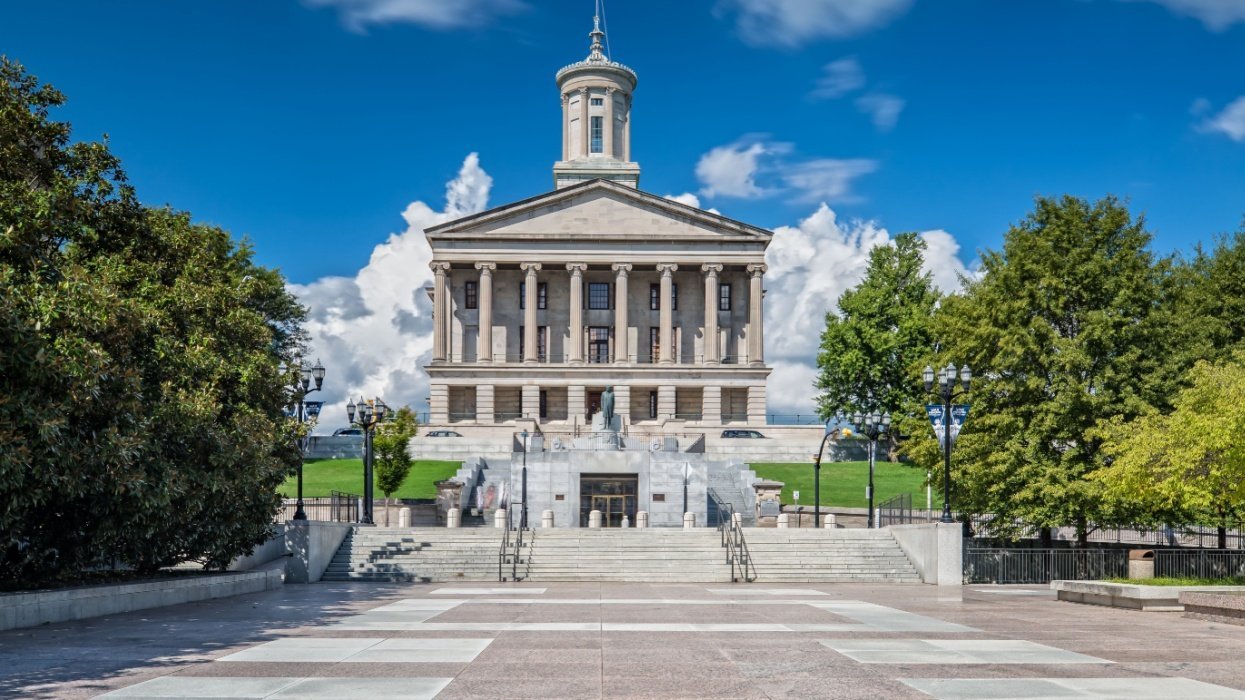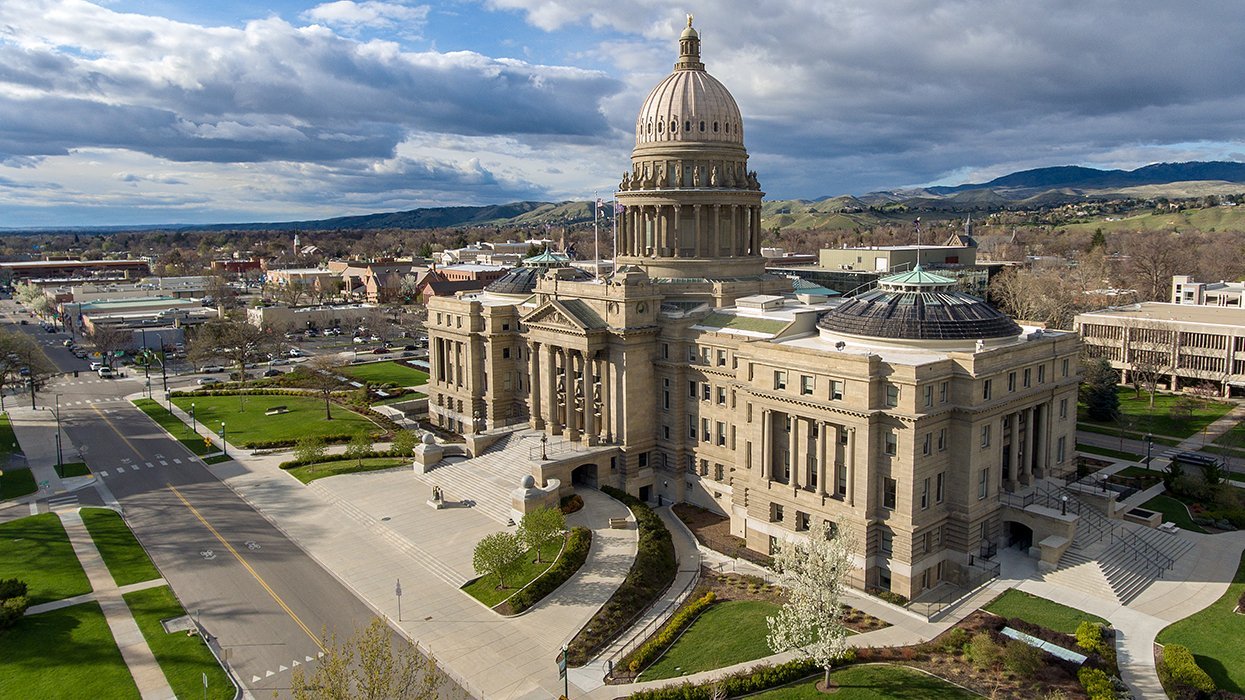CONTACTStaffCAREER OPPORTUNITIESADVERTISE WITH USPRIVACY POLICYPRIVACY PREFERENCESTERMS OF USELEGAL NOTICE
© 2024 Pride Publishing Inc.
All Rights reserved
All Rights reserved
By continuing to use our site, you agree to our Private Policy and Terms of Use.
Despite laws on the books already banning gay marriage, legislators in at least nine states are pushing for new, more sweeping measures in hopes of preventing any ripple effect from laws and court rulings elsewhere. In most cases, Republican lawmakers in states with existing Defense of Marriage acts seek to go a step further by amending their constitutions to specify that marriage must be heterosexual. State representative Bill Graves, a bill sponsor in Oklahoma, wants to stipulate that same-sex unions are "repugnant to the public policy" of the state. In his State of the Union speech Tuesday, President Bush indicated he would support an amendment to the U.S. Constitution that would limit marriage to a man and a woman. He suggested this option would be needed only if "activist judges" overruled existing federal and state Defense of Marriage laws. Supporters say the constitutional amendments are necessary to ensure that legislation and court judgments in other states--such as the recent ruling in favor of gay marriage by the Massachusetts supreme judicial court--will not compel recognition of same-sex unions in their own states. Gay rights activists see the amendment campaign as vindictive and partisan. "This is a political attack motivated by fierce antigay opponents who want to slam us again and again," said Evan Wolfson, executive director of the national advocacy group Freedom to Marry. "They are not just looking to suppress gay marriage but to deny gay people any measure of legal protection and human dignity." In all, 37 states and the federal government have Defense of Marriage acts that say marriage can be between only a man and a woman. Ohio may soon become the 38th state; its senate approved one of the most far-reaching gay marriage bans in the nation on Wednesday, making only minor changes in a house-passed version. Going further than the laws in most states, Ohio's bill also would prohibit state employees from getting benefits for domestic partners, gay or straight. Proposed constitutional amendments that would ban gay marriage have been introduced in Arizona, Georgia, Indiana, Oklahoma, Kentucky, and Michigan; one is expected soon in Alabama. An Idaho Republican, Rep. Henry Kulczyk, plans to introduce a similar measure there, to the dismay of some Democrats. "We've got enough contention to deal with rather than going through a litmus test for the reactionary right," said Idaho senate minority leader Clint Stennett. Massachusetts does not have a Defense of Marriage Act, but the high-court ruling there has sparked vociferous public debate, and an antigay marriage amendment has been proposed by its lawmakers as well. In Virginia the house of delegates overwhelmingly approved a resolution Friday urging Congress to support a federal constitutional amendment defining marriage as heterosexual. The resolution now goes to the senate. "We don't want to be left in the lurch where the measure we passed overwhelmingly several years ago is stricken down by the high court of this country," said the resolution's sponsor, Robert McConnell, referring to Virginia's existing Defense of Marriage Act. Georgia's proposed amendment--which could go on the November general election ballot--was presented on Wednesday in the state senate. Any change to traditional marriage "begins to tear at the foundations of our institutions," said senate Republican leader Bill Stephens. Gay rights advocates and some Democratic lawmakers denounced the measure as politically motivated. "The purpose of amendments is to create protections for the citizens of Georgia, not to write discrimination into the constitution," said Allen Thornell, executive director of the gay rights group Georgia Equality. The American Friends Service Committee--a Quaker social justice group--this week joined the campaign against the proposed amendment in Michigan. In Kentucky about 30 gay rights supporters protested Wednesday at the state capitol, many carrying signs reading, "Anti-marriage amendments hurt my family." Two Kentucky legislators who oppose the amendment are sponsoring a counterproposal that would outlaw discrimination against gays. "There's no excuse why fairness cannot be passed," said Democratic representative Kathy Stein. "Other than the fact that, unfortunately, a number of my colleagues...are afraid to think about it." Pending final resolution of the Massachusetts court ruling, no state allows full-fledged same-sex marriages. Vermont recognizes marriagelike civil unions, while California, Hawaii, and New Jersey grant various rights to same-sex couples registered as domestic partners. Legislators in Maryland and Colorado hope to get civil union legislation considered by their colleagues this session. If Ohio enacts its pending Defense of Marriage Act as expected, only 12 states, including Massachusetts, would be without one. The others are Connecticut, Maryland, New Hampshire, New Jersey, New Mexico, New York, Oregon, Rhode Island, Vermont, Wisconsin, and Wyoming.
Want more breaking equality news & trending entertainment stories?
Check out our NEW 24/7 streaming service: the Advocate Channel!
Download the Advocate Channel App for your mobile phone and your favorite streaming device!
From our Sponsors
Most Popular
Here Are Our 2024 Election Predictions. Will They Come True?
November 07 2023 1:46 PM
17 Celebs Who Are Out & Proud of Their Trans & Nonbinary Kids
November 30 2023 10:41 AM
Here Are the 15 Most LGBTQ-Friendly Cities in the U.S.
November 01 2023 5:09 PM
Which State Is the Queerest? These Are the States With the Most LGBTQ+ People
December 11 2023 10:00 AM
These 27 Senate Hearing Room Gay Sex Jokes Are Truly Exquisite
December 17 2023 3:33 PM
10 Cheeky and Homoerotic Photos From Bob Mizer's Nude Films
November 18 2023 10:05 PM
42 Flaming Hot Photos From 2024's Australian Firefighters Calendar
November 10 2023 6:08 PM
These Are the 5 States With the Smallest Percentage of LGBTQ+ People
December 13 2023 9:15 AM
Here are the 15 gayest travel destinations in the world: report
March 26 2024 9:23 AM
Watch Now: Advocate Channel
Trending Stories & News
For more news and videos on advocatechannel.com, click here.
Trending Stories & News
For more news and videos on advocatechannel.com, click here.
Latest Stories
After decades of silent protest, advocates and students speak out for LGBTQ+ rights
April 13 2024 10:52 AM
11 celebs who love their LGBTQ+ siblings
April 13 2024 10:33 AM
The 10 most challenged books of last year
April 13 2024 10:06 AM
Mary & George's Julianne Moore on Mary's sexual fluidity and queer relationship
April 13 2024 10:00 AM
Investigation launched after man screams homophobic slurs at queer couples on D.C. metro
April 13 2024 9:59 AM
Germany makes it easier to change gender and name on legal documents
April 12 2024 6:06 PM
A youth's call to action on this Day of NO Silence
April 12 2024 5:00 PM
Democrats introduce resolution in support of LGBTQ+ youth
April 12 2024 4:35 PM
Colton Underwood is hoping to create a gay reality TV dating show
April 12 2024 4:28 PM
Idaho closes legislative session with a slew of anti-LGBTQ+ laws
April 12 2024 1:39 PM

Pride
Yahoo FeedElevating pet care with TrueBlue’s all-natural ingredients
April 12 2024 1:39 PM
Watch Jimmy Kimmel's hilarious LGBTQ+ campaign video: 'You can't spell Biden without Bi'
April 12 2024 12:00 PM

Pride
Yahoo FeedCreating erotic art and advocacy with adult entertainer Cody Silver (EXCLUSIVE)
April 12 2024 11:39 AM
How I navigated through religious trauma
April 12 2024 11:00 AM
Trending stories
Most Recent
Recommended Stories for You

















































































